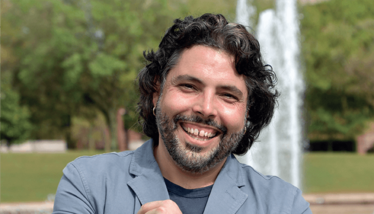Tracing the Origins of Antibiotic Resistance
Improved mutational understanding may help develop therapeutics against antimicrobial resistance
Jamie Irvine | | 5 min read | Interview

Microbiologists from the University of Central Florida have been busy tracing the evolutionary origins of antimicrobial resistance (AMR) in bacteria. The study, published in PLOS Genetics, provides insight into the conditions that must occur for infectious agents to become resistant. The team used computational and molecular approaches to focus on the bacterium that cause cholera and genetic variants of a protein found in bacterial membranes called OmpU. Notably, the research identified several OmpU mutations in cholera bacteria that led to resistance to numerous antimicrobial agents. This resistance included antimicrobial peptides that act as defenses in the human gut.
We spoke with Salvador Almagro-Moreno, Associate Professor of Medicine at the Burnett School of Biomedical Sciences, University of Central Florida, to learn more.
How did you become interested in AMR and cholera?
AMR is a major threat to public health. New resistance mechanisms are constantly emerging and spreading globally, which threatens our ability to treat common infectious diseases. In fact, there is a growing list of infections – including cholera – that are becoming harder to treat as antibiotics become less effective due to the emergence of resistance.
As opposed to other medical fields, microbiology is one of the few areas where we know things will get worse over time – either through the emergence of novel pathogens or acquisition of AMR.
Cholera affects vulnerable populations and places with limited access to clean water and sanitation. For me, I find this morally reprehensible – and that fuels my research to provide insights to tackle this and other forgotten diseases.
How did this particular line of research get started?
It started with one deceivingly simple question: Why does only a small group of strains of the Vibrio cholerae species cause cholera? When I started my lab, we proposed that pathogenic strains of V. cholerae encode allelic variations in their core genome that confer preadaptations for virulence. In other words, the adaptation to the human host happens in the environment before the bacterium comes in contact with humans.
We eventually discovered that the gene encoding the porin OmpU harbored these preadaptations. More specifically, the cholera-causing allele from toxigenic strains confer resistance to host antimicrobials, whereas most alleles from environmental strains do not. Soon after, we found four specific domains that made the porin resistant to these and other antimicrobials.
These findings highlight the complexity of antimicrobial resistance. In just one porin, you have differential resistance to antimicrobials depending on the set of domains possessed by the specific allele. This also demonstrates that a “one size fits all” approach will not work with AMR infections. Ultimately, these alleles circulate in the environment and can be acquired via recombination, which makes the spread of resistance an almost inescapable consequence of antibiotic misuse.
Our research project started with two alleles: one encoded by toxigenic strains (resistant), and one encoded by an environmental V. cholerae strain (sensitive). We wanted to identify the amino acid residues and/or protein domains that conferred these phenotypes. However, due to the large variability between these alleles, we had to pinpoint the regions in the protein that lead to the emergence of AMR, and develop an alternative approach.
This led us to construct 14 mutant strains each encoding a different allele of OmpU and examine their AMR profile. With this information, we generated a genotype–phenotype matrix that clustered alleles as resistant or sensitive. Doing this allowed us to identify domains shared between all the resistant ones that also differed from the sensitive ones.
Despite being more convoluted than we initially anticipated, this approach ultimately led to the identification of specific regions we ended up investigating.
What were the most unexpected results to emerge from your research?
I would say two things were particularly surprising. First, the fact that resistance to some antimicrobials was not dependent on the allele they encode. For instance, all the alleles we tested conferred resistance to the antibiotic Polymyxin B. Whereas resistance to others was strongly dependent on the type of allele encoded.
Secondly, we also uncovered an astonishing degree of specificity and hierarchy between the domains we identified. In fact, some domains did not play a role individually, but did in combination, and this role changed depending on the antimicrobial used.
Constructing and testing the quadruple mutant encoding the four domains was a critical moment of the project. We had developed this framework over years and it all could have collapsed if the quadruple mutant with all the domains mutated had shown resistance to the antimicrobials. It was a mix of happiness and relief. Even though the majority of the mutant version of OmpU was similar to the wild-type strain, we found it showed a similar profile to the deletion mutant.
What happens next?
We are interested in understanding how these domains emerge and get selected in nature. What are the ecological drivers that foster the emergence of these domains? This work will shed light on the true roots of antimicrobial resistance.
Our findings highlight how refined and pervasive AMR is, which can inform novel approaches towards addressing the emergence and spread of AMR. For instance, our findings might help explain why combinations of antimicrobials might be more suitable to treat some infections as we found some negative correlations between domains that confer resistance to one antimicrobial yet render the strain sensitive to others in a mutually exclusive fashion.
Associate Editor, The Medicine Maker



















